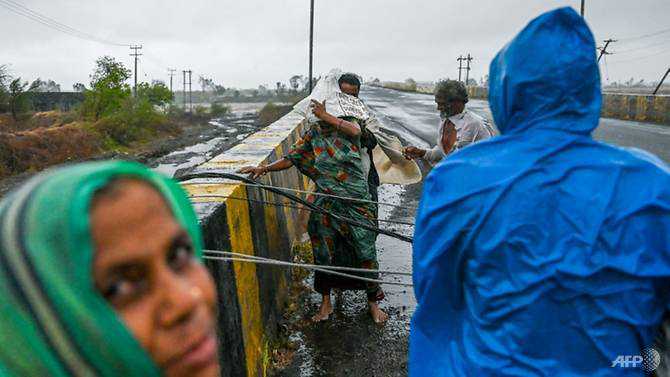21 dead, 96 missing as cyclone batters COVID-19 stricken India
18 May, 2021

At least 21 people were dead and 96 were missing on Tuesday (May 18) after a monster cyclone slammed into western India, compounding the misery for an incredible number of others who are enduring a devastating COVID-19 surge.
Hundreds of thousands of people were without electricity after Cyclone Tauktae, one of an increasing number of increasingly severe storms found in the Arabian Sea blamed on climate transformation, hammered the Gujarat coast on Mon evening.
The cyclone packed gusts as high as 185kmh, uprooting trees and knocking straight down power lines and mobile phone towers as it barrelled inland while weakening slightly.
One support vessel serving oil rigs that were strike by immense waves off the coast of Mumbai sank and 96 of the 273 people who had been up to speed were missing, the Indian Navy said in Tuesday.
The defence ministry said 177 people were rescued from the vessel, with functions expected to continue during the day in "extremely challenging sea conditions".
Elsewhere one new casualty was reported on Tuesday, bringing the confirmed death toll to at least 21 just as savage winds swept through flimsy homes and turned streets into rivers.
Commuters wade through a waterlogged street throughout a heavy rain in Mumbai, India, May 17, 2021. (Image: AP/Rajanish Kakade)
Although the cyclone was one of the fiercest to hit the area in decades, better forecasting than in recent years allowed for strong preparations, and a lot more than 200,000 people in danger zones were evacuated from their homes.
Mumbai authorities on Monday closed the airport for several hours and urged people to remain indoors as big waves battered the city's seafront.
COVID-19 CATASTROPHE
The deadly weather system has hindered India's embattled response to a coronavirus surge that's killing at least 4,000 persons daily, and pushing the health system to breaking point.
Mumbai shifted on Sunday about 600 COVID-19 patients in discipline hospitals "to safer locations", while sea amounts swelled as high just as 3m near to the seaside town of Diu.
Waves lash above onto a shoreline in Mumbai on Monday, May 17, 2021, due to Cyclone Tauktae, packing ferocious winds and threatening a good destructive storm surge, bore down on India, disrupting the country's response to its devastating COVID-19 outbreak. (Image: AFP/Sujit Jaiswal)
In Gujarat, all COVID-19 patients in hospitals within 5km of the coast were as well moved.
But one COVID-19 sufferer died in the city of Mahuva after he cannot be moved in time before the storm reach, doctors said.
Authorities there scrambled to ensure there would be no vitality cuts in the practically 400 designated COVID-19 hospitals and 41 oxygen plants in the area.
More than 1,000 COVID-19 hospitals found in coastal towns have been given generators, chief minister Vijay Rupani told reporters.
The state also suspended vaccinations for just two days. Mumbai have the same for just one day.
TERRIBLE DOUBLE BLOW
"This cyclone is an awful double blow for millions of individuals in India whose families have already been struck straight down by record COVID-19 infections and deaths," said Udaya Regmi from the International Federation of Red Cross and Crimson Crescent Societies.
The organisation said it had been helping authorities to evacuate persons most at risk in coastal areas, providing medical, masks "and encouraging other critical COVID-19 prevention measures".
Last May, a lot more than 110 persons died after "super cyclone" Amphan ravaged eastern India and Bangladesh in the Bay of Bengal.
The Arabian Sea previously experienced fewer severe cyclones compared to the Bay of Bengal but rising water temperatures because of global warming was changing that, Roxy Mathew Koll from the Indian Institute of Tropical Meteorology told AFP.
Satellite map showing projected way of cyclone Tauktae which made landfall in India late Monday. (Photo: AFP/Patricio Arana)
"(The) Arabian Sea is probably the fastest-warming basins over the global oceans," he said.
The effects were felt all over with authorities in Nepal, about 2,000km from Gujarat, advising climbers on Everest and additional mountains to remain put.
But a lot more than 200 climbers ignored the warnings and were heading up Everest, eyeing for the summit end of the week, a government official at the bottom camp said.
"I had already made a decision to wait for summit following the 24th as the jet wind was inside our region. Right now the cyclone can be bringing moisture and perhaps snow with it," Dawa Steven Sherpa of expedition organiser Asian Trekking told AFP.
The cyclone was expected to carry substantial rains as a long way away as Delhi, a lot more than 1,200km from the Gujarat coast and Uttarakhand on the Himalayan border with Tibet.
Source:
